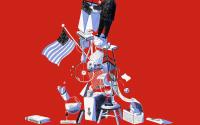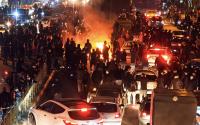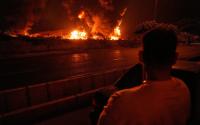January 6, 2005Guardian
A staple of the 1950s B-movie was the scene in which a throng of people suddenly froze, halted by a blinding light or a piercing noise. Yesterday there was no dazzling flash, no alien siren, just an announcement over the Tannoy. But, for three minutes, people stopped and did not move.
In memory of the victims of the Asian tsunami disaster, they silenced their phones and paused. Marking the day the Earth wobbled on its axis, this was to be the day the Earth stood still.
In Euston station in London, the silence was honoured almost completely. The public address system called people to order and they stood wherever they were - just under the departures board or by the escalators - and said nothing.
Some didn't know what was going on. There was the sound of suitcase wheels scratching the ground, even a distant laugh. One woman carried on talking into her mobile, earning a few daggered stares. A child was running, arms outstretched, like a plane.
The rest held their hands at their sides, or linked their fingers to make a ball. Most were alone; a few couples stood close together. Many bowed their heads or shut their eyes in what, they would say later, was prayer.
What were they thinking during those 180 seconds, deprived of the usual distractions, in a place normally so full of bustle, hurry and noise?
Some said they were picturing the disaster itself, the very moment the wave came. They were trying to imagine what it would have been like, thinking themselves into that instant: standing on a beach, hearing the roar, running for their lives. They tried to imagine it, there in a London station in the January silence, but it was too far away.
Others tried to think of the survivors, people now getting by without a son or a daughter, a husband or wife. They thought of specific individuals whose stories they had seen on the news or read in the papers. Somehow focusing on an individual was easier than contemplating a death toll so large as to be out of reach: 150,000 deaths are too many. The number is too numb. To contemplate one loss seemed as much as the mind could take.
There were a few dissenters, including one man worried about silence inflation - the constantly expanding duration of these moments of national reflection: a minute for Diana, two for 9/11, three for the tsunami.
Most, though, seemed glad of the chance for collective reflection. Until now, the tsunami had been experienced differently from other world-changing events. Because it fell over the holiday season, people followed it alone or with their families but at home, behind their own front doors. They were not at work or at school, where they could talk about it with others. The streets were empty for days at a stretch.
Yesterday was only the second day since life in public resumed: people were in crowds again. And, because there was no place to queue or lay flowers, as in the now-legendary Diana week, the three-minute silence became the first and only collective action available.
The station was a good place for it. Inside small offices or private homes it can be embarrassing to stand still, saying nothing. In a car you can pull over and switch off the engine, but that can feel awkward too. Euston had the right balance. It was large enough for the moment, its high ceiling appropriate for its transformation into an impromptu, 21st-century cathedral. There was just the right degree of anonymity, of distance from strangers, to reduce the sense of self-consciousness.
And, just as they might in a church, mosque or synagogue, people allowed their minds to wander. "I was thinking about my own life," admitted Leon Alexis, 22, who spends every working day at Euston, fielding passengers' queries. "Tomorrow I could die; anything could happen. I was thinking about all the things I still want to do. I want to play rugby, because I'm really good at it. And I was thinking, you only get one shot at life."
Others were grateful for a chance to see the rat race put on hold, if only for a few minutes. That carried an extra charge in Euston which, like most major stations these days, doubles as a shopping mall.
In the silence, the lines of franchise stores looked oddly different.
It wasn't just the easy abundance of Starbucks and Burger King. The name of Marks & Spencer's grocery shop - Simply Food - seemed too glib: nothing simple about food for the people of Aceh. Body Shop's slogan "Protect our Planet" prompted a heretical thought: shouldn't that be protection from our planet?
Vicki Gribble, a sales assistant at the concourse record store, was glad for the chance to turn off the music - and stop all the clocks.
A native of Australia, she had holidayed in the region herself: for three minutes she considered how lucky she had been. "It's so easy to be in the wrong place at the wrong time," she said.
The woman talking into a mobile had been close to Vicki when the silence began. "It annoys me that people can't shut up for three minutes," said Vicki. "It's not much time out of your life, is it?"
This was a European Union initiative, to share a collective moment of solidarity with the people of the Indian Ocean rim. But Britain still put its own stamp on it.
Our silence came an hour after everyone else's: on our own, as usual. And in Euston, when the three minutes were up, we returned to our favourite national pastime - and began queuing.
The moment of release was just as the B-movies always promised. Instantly people unfroze and returned to their usual business - hurrying, chatting, buying. All was as normal, but for the giant TV screen right by the departure board, beaming the latest BBC news. The pictures were from far away, showing a world turned upside down.






